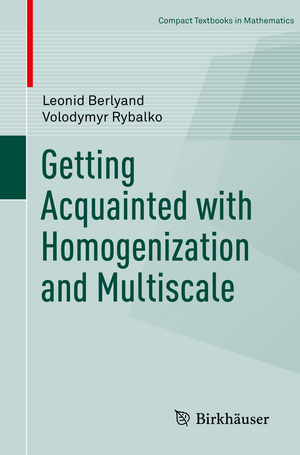Getting Acquainted with Homogenization and Multiscale: Compact Textbooks in Mathematics
Autor Leonid Berlyand, Volodymyr Rybalkoen Limba Engleză Paperback – 29 noi 2018
Din seria Compact Textbooks in Mathematics
-
 Preț: 540.11 lei
Preț: 540.11 lei -
 Preț: 422.90 lei
Preț: 422.90 lei -
 Preț: 281.15 lei
Preț: 281.15 lei -
 Preț: 319.43 lei
Preț: 319.43 lei - 20%
 Preț: 300.32 lei
Preț: 300.32 lei -
 Preț: 421.93 lei
Preț: 421.93 lei - 20%
 Preț: 339.32 lei
Preț: 339.32 lei -
 Preț: 359.81 lei
Preț: 359.81 lei - 15%
 Preț: 494.85 lei
Preț: 494.85 lei -
 Preț: 348.39 lei
Preț: 348.39 lei -
 Preț: 585.27 lei
Preț: 585.27 lei -
 Preț: 452.83 lei
Preț: 452.83 lei -
 Preț: 350.72 lei
Preț: 350.72 lei - 15%
 Preț: 466.13 lei
Preț: 466.13 lei -
 Preț: 445.43 lei
Preț: 445.43 lei -
 Preț: 356.49 lei
Preț: 356.49 lei -
 Preț: 486.03 lei
Preț: 486.03 lei -
 Preț: 427.33 lei
Preț: 427.33 lei -
 Preț: 382.57 lei
Preț: 382.57 lei -
 Preț: 348.22 lei
Preț: 348.22 lei -
 Preț: 356.49 lei
Preț: 356.49 lei -
 Preț: 356.49 lei
Preț: 356.49 lei -
 Preț: 363.36 lei
Preț: 363.36 lei -
 Preț: 354.93 lei
Preț: 354.93 lei -
 Preț: 314.21 lei
Preț: 314.21 lei -
 Preț: 389.70 lei
Preț: 389.70 lei -
 Preț: 378.21 lei
Preț: 378.21 lei -
 Preț: 315.18 lei
Preț: 315.18 lei -
 Preț: 389.70 lei
Preț: 389.70 lei -
 Preț: 388.90 lei
Preț: 388.90 lei -
 Preț: 348.98 lei
Preț: 348.98 lei -
 Preț: 320.84 lei
Preț: 320.84 lei -
 Preț: 324.01 lei
Preț: 324.01 lei -
 Preț: 414.72 lei
Preț: 414.72 lei -
 Preț: 385.10 lei
Preț: 385.10 lei -
 Preț: 414.04 lei
Preț: 414.04 lei -
 Preț: 356.31 lei
Preț: 356.31 lei -
 Preț: 447.41 lei
Preț: 447.41 lei -
 Preț: 316.71 lei
Preț: 316.71 lei -
 Preț: 381.81 lei
Preț: 381.81 lei -
 Preț: 482.74 lei
Preț: 482.74 lei
Preț: 356.49 lei
Nou
Puncte Express: 535
Preț estimativ în valută:
68.21€ • 71.22$ • 56.46£
68.21€ • 71.22$ • 56.46£
Carte disponibilă
Livrare economică 14-28 martie
Preluare comenzi: 021 569.72.76
Specificații
ISBN-13: 9783030017767
ISBN-10: 3030017761
Pagini: 164
Ilustrații: XVIII, 178 p. 42 illus., 14 illus. in color.
Dimensiuni: 155 x 235 mm
Greutate: 0.45 kg
Ediția:1st ed. 2018
Editura: Springer International Publishing
Colecția Birkhäuser
Seria Compact Textbooks in Mathematics
Locul publicării:Cham, Switzerland
ISBN-10: 3030017761
Pagini: 164
Ilustrații: XVIII, 178 p. 42 illus., 14 illus. in color.
Dimensiuni: 155 x 235 mm
Greutate: 0.45 kg
Ediția:1st ed. 2018
Editura: Springer International Publishing
Colecția Birkhäuser
Seria Compact Textbooks in Mathematics
Locul publicării:Cham, Switzerland
Cuprins
Chapter 1- Preliminaries.- Chapter 2- What is Homogenization and Multiscale? First Examples.- Chapter 3- Brief History and Surprising Examples in Homogenization.- Chapter 4- Formal Two-scale Asymptotic Expansions and the Corrector Problem.- Chapter 5- Compensated Compactness and Oscillating Test-functions.- Chapter 6- Two-scale Convergence.- Chapter 7- Examples of Explicit Effective Coefficients: Laminated Structures and 2D Checkerboards.- Chapter 8- Introduction to Stochastic Homogenization.- Chapter 9- G-Convergence in Nonlinear Homogenization Problems.- Chapter 10- An Example of a Nonlinear Problem: Homogenization of Plasticity and Limit Loads.- Chapter 11- Continuum Limits for Discrete Problems with Fine Scales.- References.- Appendix: Regular and Singular Perturbations and Boundary Layers.- Index.
Recenzii
“This book is an invitation to the young researcher to start using modern asymptotic methods of the applied mathematics of multiscale systems.” (Adrian Muntean, zbMATH 1441.35001, 2020)
Notă biografică
Leonid Berlyand is a Professor of Mathematics, and a member of the Materials Research Institute and Huck Institutes for Life Sciences at the Pennsylvania State University (USA) as well as an Honorary Professor (Professoris Honoris Cavza) at the Moscow State University. Leonid Berlyand is an internationally recognized expert in applied mathematics. He has made fundamental contributions to homogenization theory, mathematical Ginzburg-Landau theory, and mathematical biology.
Volodymyr Rybalko works as a senior research fellow in Mathematical Division, B.Verkin Institute for Low Temperature Physics and Engineering of National Academy of Sciences of Ukraine. He is an expert in the area of PDEs, he is known, in particular, for his contributions in homogenization theory.
Volodymyr Rybalko works as a senior research fellow in Mathematical Division, B.Verkin Institute for Low Temperature Physics and Engineering of National Academy of Sciences of Ukraine. He is an expert in the area of PDEs, he is known, in particular, for his contributions in homogenization theory.
Textul de pe ultima copertă
The objective of this book is to navigate beginning graduate students in mathematics and engineering through a mature field of multiscale problems in homogenization theory and to provide an idea of its broad scope. An overview of a wide spectrum of homogenization techniques ranging from classical two-scale asymptotic expansions to Gamma convergence and the rapidly developing field of stochastic homogenization is presented. The mathematical proofs and definitions are supplemented with intuitive explanations and figures to make them easier to follow. A blend of mathematics and examples from materials science and engineering is designed to teach a mixed audience of mathematical and non-mathematical students.
Caracteristici
Development of an intuitive understanding that complements rigorous mathematics Makes advanced mathematical tools and concepts accessible to non-experts Presentations in all Chapters is supplied with exercises
